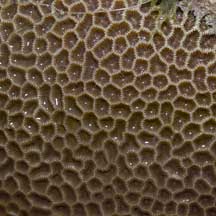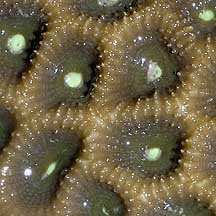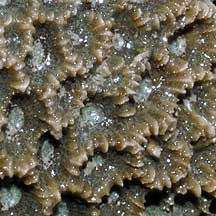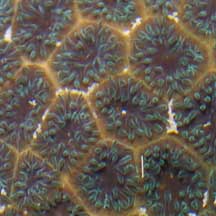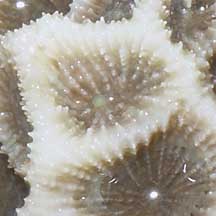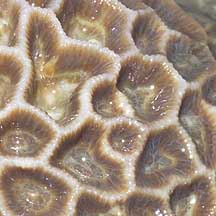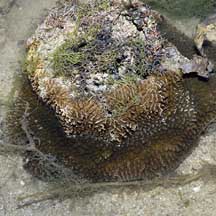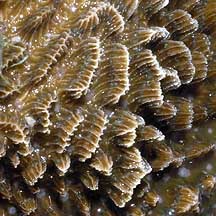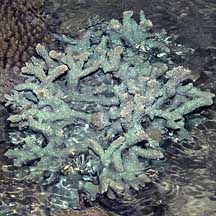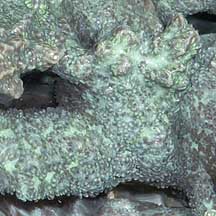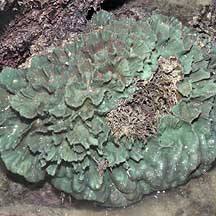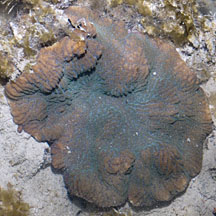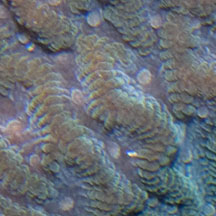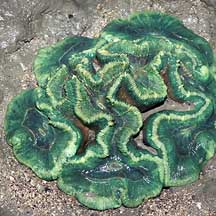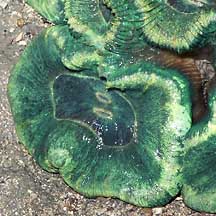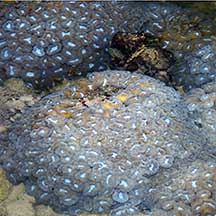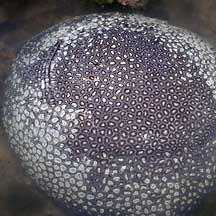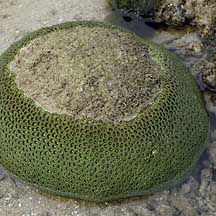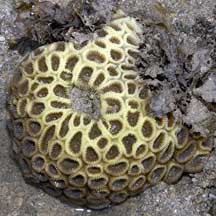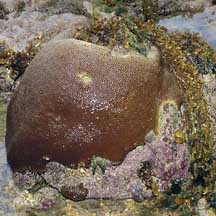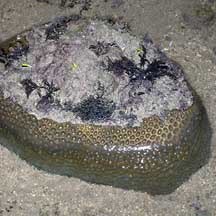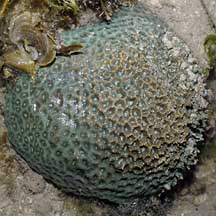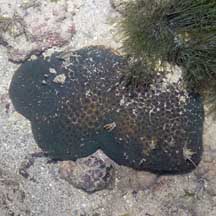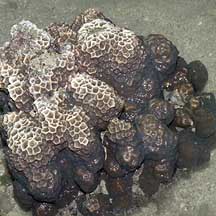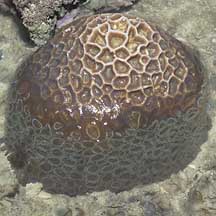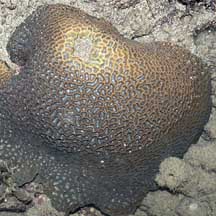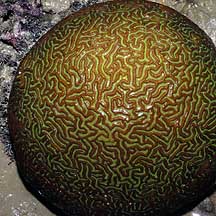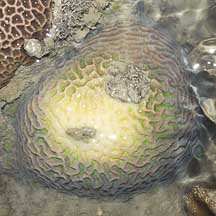Merulinid
corals
Family Merulinidae
updated
Nov 2019
Where
seen? This family now contains most of the commonly encountered corals on Singapore shores. Including those that used to be in Family Faviidae. They take on a wide variety of shapes from boulder to plates, leafy to branching. |
| Some Merulinid
corals on Singapore shores |
|
|
|
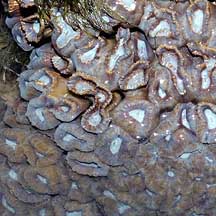
Corallites large trumpet-shaped, long narrow flaring to oval opening. |

Corallites a tiny circular ring often not packed tightly, with tiny
bumps between the corallites. |
|
|
|
|
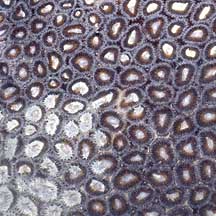
Corallites a tiny ring often packed tightly, walls purple, polyps
fleshy white or greenish. |
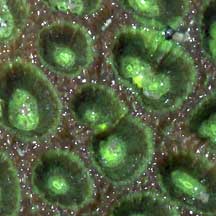
Corallites small circular ring often packed tightly. |
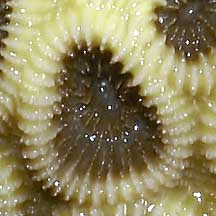
Corallites large ring-shaped often squashed tightly so they may
be oval or bean-shaped. |
|
|
|
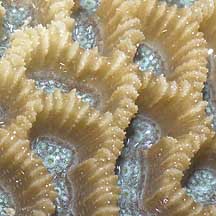
Corallites with shared walls forming irregular hexagons or short maze-like
valleys. |
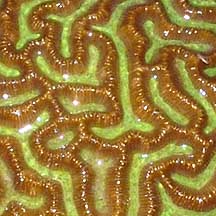
Corallites with shared parallel walls that form long meandering valleys. |
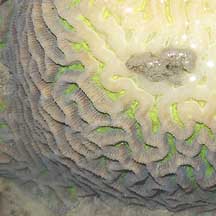
Corallites with shared walls often thick forming long meandering valleys,
maze-like or hexagonal patterns that are coarser than other kinds
of maze favid corals. |
Family
Merulinidae recorded for Singapore
from
Danwei Huang, Karenne P. P. Tun, L. M Chou and Peter A. Todd. 30 Dec
2009. An inventory of zooxanthellate sclerectinian corals in Singapore
including 33 new records
**the species found on many shores in
Danwei's paper.
Groups based on in Veron, Jen. 2000. Corals of the World.
in red are those listed as threatened
on the IUCN global list.
*from WORMS
| |
Merulinid corals seen awaiting identification
Species
are difficult to positively identify without close examination
with a microscope. On this website,
they are grouped by external features for convenience of display. |
| |
Barabattoia
amicorum**=Dipsastraea amicorum*
Caulastrea sp. (Trumpet corals) with list of species recorded for Singapore.
Cyphastrea sp. (Tiny ring favid corals) with list of species recorded for Singapore.
Echinopora sp. (Hedgehog corals) with list of species recorded for Singapore.
Favia sp.=Dipsastraea sp.*
Group
1: With small corallites (averaging less than 8mm in diameter)
Favia laxa** (Near
Threatened)=Dipsastraea laxa*
Favia stelligera (Near
Threatened)=Goniastrea stelligera*
Group
2: With medium corallites (averaging 8-12mm in diameter)
Favia matthaii** (Near Threatened)=Dipsastraea matthaii*
Favia pallida**=Dipsastraea pallida*
Favia speciosa**=Dipsastraea speciosa*
Group
3: With large corallites (averaging more than 12mm in diameter)
Favia danae**=Dipsastraea danai*
Favia favus**=Dipsastraea favus*
Favia lizardensis** (Near
Threatened)=Dipsastraea lizardensis*
Favia maritima (Near
Threatened)=Dipsastraea maritima*
Favia maxima** (Near
Threatened)=Dipsastraea maxima*
Favia rotumana**=Dipsastraea rotumana*
Favia rotundata (Near
Threatened)=Favites rotundata*
Favia veroni (Near
Threatened)=Dipsastraea veroni*
Favites sp.
Group 2: With small corallites (6-10mm in diameter)
Favites chinensis** (Near
Threatened)
Favites pentagona**
Group
3: With middle-sized corallites (10-13mm in diameter)
Favites abdita** (Near
Threatened)
Favites complanata** (Near
Threatened)
Favites halicora** (Near
Threatened)
Favites russelli (Near Threatened)
Group
4: With large corallites (over 14mm in diameter)
Favites flexuosa** (Near
Threatened)
Favites paraflexuosa** (Near
Threatened)
Goniastrea sp.
Group 1: Honeycomb pattern of corallites (monocentric) with
corallite diameter mostly less than 5mm in diameter
Goniastrea edwardsi**
Goniastrea minuta (Near
Threatened)
Goniastrea retiformis**
Group
2: Predominantly honeycomb pattern of corallites (monocentric)
with corallite more than 5mm in diameter
Goniastrea aspera**
Goniastrea palauensis** (Near
Threatened)
Group
3: Predominantly brain-like pattern of corallites (meandroid)
Goniastrea australensis**
Goniastrea favulus** (Near Threatened)
Goniastrea pectinata**
Hydnophora
sp. (Horn corals) with list of species recorded
for Singapore
Merulina sp.
(Ridged plate corals)
Merulina ampliata**
Merulina scabricula
Montastrea sp.
Group 1: With small corallites (less than 7mm in diameter)
Montastrea curta**=Astrea curta
Group
2: With middle-sized corallites (5-8 mm in diameter)
Montastrea annuligera (Near
Threatened)=Astrea annuligera*
Montastrea colemani (Near
Threatened)=Favites colemani*
Group
3: With large corallites (more than 9mm in diameter)
Montastrea magnistellata** (Near
Threatened)=Favites magnistellata*
Montastrea valenciennesi** (Near
Threatened)=Favites valenciennesi*
Mycedium elephantotus**
Scapophyllia cylindrica
Oulophyllia sp.
Oulophyllia bennettae** (Near
Threatened)
Oulaphyllia crispa** (Near
Threatened)
Pectinia sp. (Carnation coral) with list of species recorded for Singapore
Platygyra sp.
Group 1: Honeycomb pattern of corallites (monocentric) or
brain-like but forming only short valleys
Platygyra pini**
Platygyra ryukyuensis (Near
Threatened)
Platygyra verweyi** (Near
Threatened)
Group
2: Primarily brain-like pattern of corallites (meandroid)
Platygyra daedalea**
Platygyra sinensis**
Platygyra lamellina (Near
Threatened)
Trachyphyllia geoffroyi
|
|
|
Links
References
- Danwei Huang,
Karenne P. P. Tun, L. M Chou and Peter A. Todd. 30 Dec 2009. An
inventory of zooxanthellate sclerectinian corals in Singapore
including 33 new records (pdf). Raffles Bulletin of Zoology
Supplement No. 22: 69-80.
- Veron, Jen.
2000. Corals
of the World Australian Institute of Marine Science, Australia. 3 volumes.
- Chou, L.
M., 1998. A
Guide to the Coral Reef Life of Singapore. Singapore Science
Centre. 128 pages.
- Erhardt,
Harry and Daniel Knop. 2005. Corals:
Indo-Pacific Field Guide IKAN-Unterwasserachiv, Frankfurt. 305 pp.
- Borneman,
Eric H. 2001. Aquarium
Corals: Selection, Husbandry and Natural History T.F. H Publications. 464 pp
|
|
|






